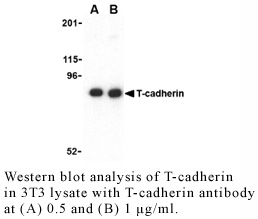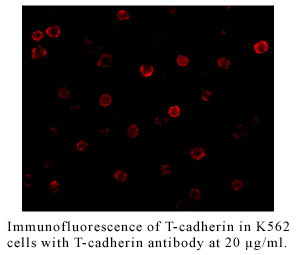Anti-Human T-Cadherin (NT) (T-cad)
Data
- -
- -
Antibody DetailsProduct DetailsReactive Species Human Host Species Rabbit Immunogen PN:T296 Product Concentration 0.5 mg/ml Formulation This polyclonal antibody is formulated in phosphate buffered saline (PBS) pH 7.4 containing 0.02% sodium azide as a preservative. Storage and Handling This polyclonal antibody is stable for at least one week when stored at 2-8°C. For long term storage, aliquot in working volumes without diluting and store at –20°C in a manual defrost freezer. Avoid Repeated Freeze Thaw Cycles. Country of Origin USA Shipping Next Day Ambient RRIDAB_2831872 Each investigator should determine their own optimal working dilution for specific applications. See directions on lot specific datasheets, as information may periodically change. DescriptionDescriptionSpecificity Rabbit Anti-Human T-Cadherin (T-cad) recognizes an epitope near the N-terminus of Human, Mouse and Rat T-cad. This polyclonal antibody was purified using affinity chromatography. Background T-cadherin was initially identified as cadherin-type cell adhesion molecule expressed in various neuronal populations in a temporally and spatially restricted pattern during axon growth.1 T-cadherin is an atypical member of the cadherin family because it does not possess the typical transmembrane and cytoplasmic domains but is instead anchored to the plasma membrane by glycosylphosphatidylinositol (GPI) linkage.2 T-cadherin may play a role in malignant tumor development as loss of the chromosome locus containing the T-cadherin gene correlates with the development of a variety of cancers.3,4 Recently it has been shown that T-cadherin can act as a receptor for hexameric and high-molecular weight forms of adiponectin, suggesting that T-cadherin may also play a role in metabolic regulation. PubMed References & Citations1. Ranscht, B. et al. (1991) Neuron 7:391 2. Ivanov, DB. et al. (2001) Biochemistry (Moscow) 66:1175 3. Takeuchi, T. et al. (1999) Histopathology 35:87 4. Sato, M. et al. (1998) Hum. Gen. 103:96 Technical ProtocolsCertificate of Analysis |




